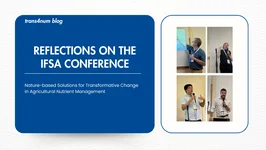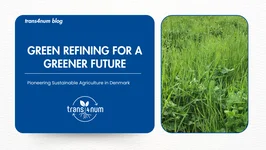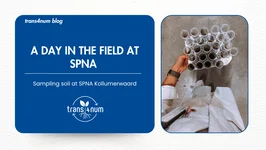| Communication team
Building pathways for sustainable nutrient management
by Friederike Selensky
At trans4num, we are on a mission to revolutionize how nutrients like nitrogen and phosphorus are managed in agriculture. Instead of depending on synthetic fertilizers, we are exploring how nature-based solutions (NBS) can help create circular, sustainable nutrient systems. Our journey is deliberate and adaptive, made up of small, meaningful steps that together move us toward large-scale change. We are learning as we go, guided by evidence, community voices, reflections on results and the shared vision of a more resilient and sustainable nutrient management.
What we are working on
The transformation pathways report is a core part of our work in Work Package 1. It maps out how change happens, from early adoption of NBS at trial sites, to full system transformation across agriculture. We are trying to understand what helps and what hinders this journey.
Why is this important? Because the way we manage nutrients today does not have a future. It harms water, soils, and biodiversity and in the case of phosphorus could lead to geopolitical dependences. We need a radical shift, but one that is practical, inclusive, and grounded in real-world challenges.
How we are doing it:
trans4num’s approach is as thoughtful as it is ambitious. It combines:
- Understanding barriers and enablers of transformation through literature reviews to learn from past transitions in agriculture and through case studies to learn from current innovations.
- Participatory tools like workshops and hackathons to co-design change with farmers, local stakeholders and wider society.
- Transformation frameworks that help us think about not just what to change, but how change unfolds - over time, across sectors, and through different levels of society to co-design pathways.
Our approach is:
- Adaptive, because every location is different.
- Inclusive, because transformation only works when people are part of shaping it.
- Iterative, because intended pathways need to be revisited with new results and insights
- Incremental, because big change does not happen overnight.
What we learned so far
We have identified some key drivers of change:
- Incremental steps add up. Trial sites are small, but they serve as vital testing grounds that feed into larger systemic changes.
- Barriers and Drivers vary by context but are similar. A lack of resources, entrenched practices, and weak governance are common challenges, but they can be addressed through tailored support and local engagement as ecosystem services are valued.
- Local knowledge is gold. Combining traditional wisdom with modern techniques leads to more adaptable, resilient solutions and builds trust and collaboration.
- Transformation is non-linear. Some changes are quick, others take time, but all contribute to the bigger picture.
The transformation to circular nutrient systems is not a straight path, but it is a necessary one. One major hurdle is visibility: nutrient management is not something most people see or talk about. Creating awareness and urgency is tough when the benefits are slow to show. To overcome this, Trans4num invests in strong storytelling and stakeholder engagement, highlighting connections between soil health, climate resilience and pragmatic change. The work we’ve done so far gives us hope: by combining science, local knowledge, and creative collaboration, we can build new pathways that are both practical and visionary.
Be part of the change!
Are you a farmer, policymaker, researcher, or curious citizen? Join us at our upcoming stakeholder workshops and trial site events. Let’s co-create a future where agriculture works with nature, not against it.



